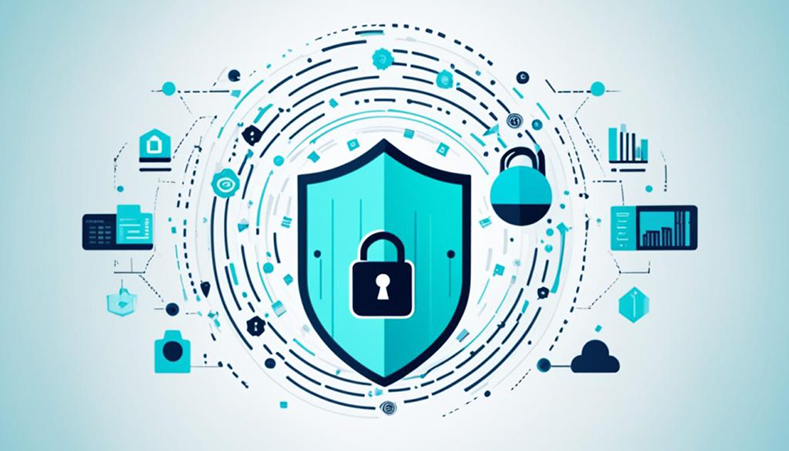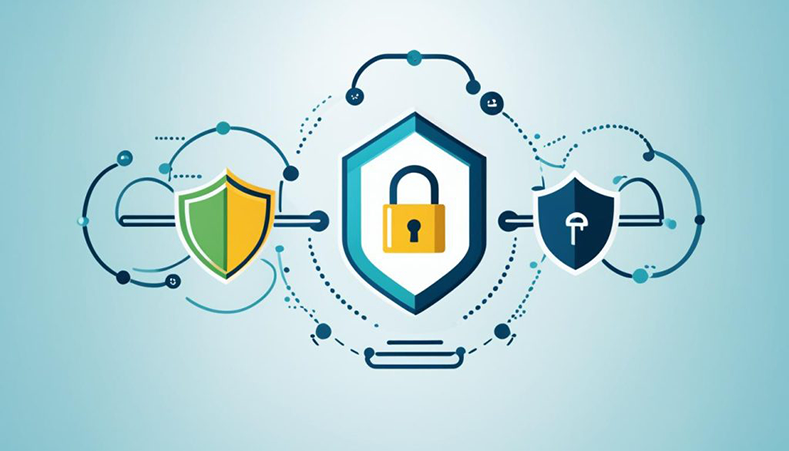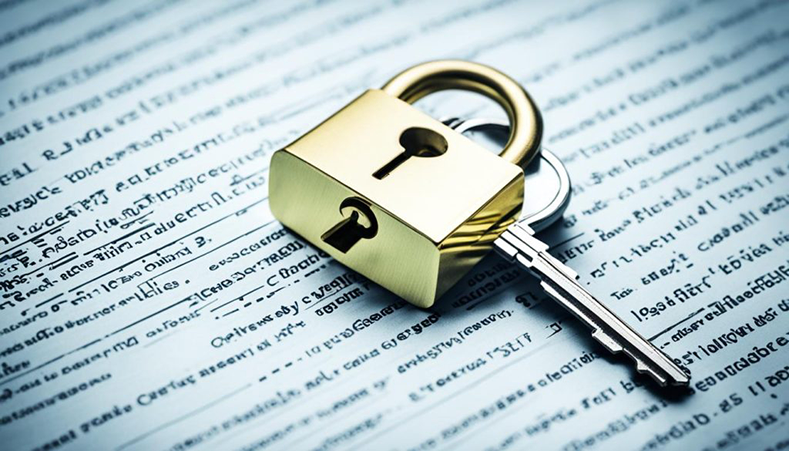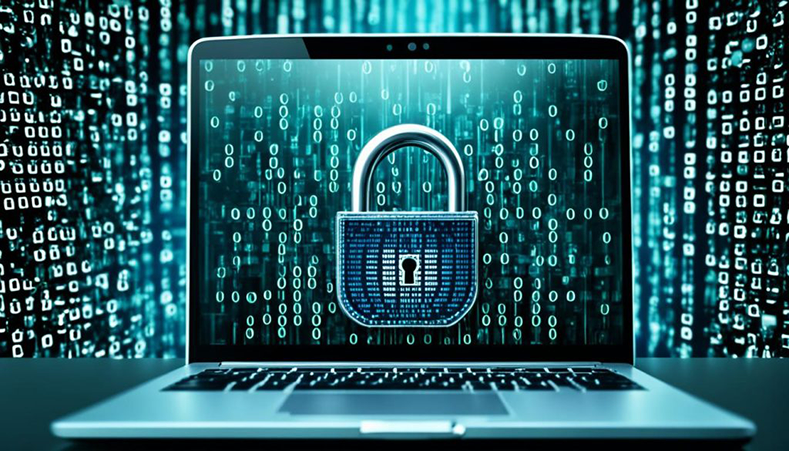Data Privacy vs Security: What You Need to Know
In today’s digital world, data is a key asset for both businesses and individuals. But, with more tech use, worries about keeping data private and secure have grown. “Data privacy” and “data security” are often mixed up, but they really mean different things that work together.
Data privacy is about how we handle, store, and use personal info. It’s about making sure people’s data like names and bank details stay safe from wrong hands. Data security, though, is about keeping this personal data safe from hackers and other dangers. It makes sure the data stays true and whole.
Data security and privacy are not the same, but they go hand in hand. You need strong security to keep personal info safe from hackers and data breaches. Without good security, keeping data private is hard.
Key Takeaways
- Data privacy and data security are distinct but interconnected concepts.
- Data privacy focuses on the proper handling and usage of personal information, while data security aims to protect data from unauthorized access and exploitation.
- Data security is a fundamental requirement for ensuring data privacy.
- Robust data security measures, including encryption, access control, and breach response, are essential for protecting personal information.
- Compliance with data privacy regulations, such as the General Data Protection Regulation (GDPR), is crucial for businesses and organizations.
Table of Contents
Understanding Data Privacy
Data privacy is about how we handle and use personal information. It’s about giving people control over their own data. This includes the right to keep their information private. Many countries see it as a basic human right.
Definition of Data Privacy
Data privacy is about rules for collecting, using, and protecting personal info. It means people can decide how their data is shared and used. They should be okay with it first.
Why Data Privacy is Important
Data privacy protects us from risks like identity theft and fraud. With so much data being shared, we need strong privacy rules. Laws like the GDPR and CCPA help protect our rights and keep companies in check.
It’s key for trust between us and those who have our data. Good data handling builds trust and a strong reputation for companies.
| Key Data Privacy Statistics | Insights |
|---|---|
| 90% of the data in use today was created in the last two years | The exponential growth in data collection highlights the urgent need for robust data privacy measures. |
| GDPR imposes fines of up to €20 million or 4% of total annual turnover for noncompliance | The severe consequences of failing to adhere to data privacy regulations emphasize the importance of compliance. |
| Many countries have comprehensive data protection laws, including Canada, Japan, Australia, Singapore, Brazil, and the UK | The global trend towards strengthening data privacy laws demonstrates the widespread recognition of its significance. |
In conclusion, data privacy is vital in today’s world. It lets people control their data and protects them from misuse. As data collection grows, we must keep up with strong privacy laws and rules.
Understanding Data Security
Data security is key to keeping personal info and digital stuff safe. It’s about keeping data away from unauthorized access and attacks. It makes sure data stays secure and only those allowed can see it.
Definition of Data Security
Data security uses processes and tech to keep digital info safe from threats like cyber attacks and data breaches. It uses things like encryption and access control to stop data from being misused or stolen.
The Importance of Data Security
Data security is vital because it protects people and companies from data breaches. Data security keeps important info like personal details and business secrets safe from bad actors. It helps prevent data loss, keeps companies in line with laws, and keeps trust in the company.
Some key reasons why data security is important include:
- Protecting personal and financial info from theft and fraud
- Keeping business secrets safe from competitors
- Following data privacy laws
- Stopping damage to reputation and losing customer trust because of data breaches
- Keeping important business data safe and whole
Strong data security practices help protect against data breaches. They keep digital assets safe and show a company’s commitment to protecting data and privacy.
“Cybersecurity is no longer just an IT issue, but a critical business risk that must be addressed at the highest levels of an organization.”
In short, data security is key to protecting sensitive info and digital assets from threats. It’s a big part of keeping an organization’s info safe and secure.
Similarities and Differences Between Data Privacy and Data Security
Data privacy and data security are closely linked but have different goals. Data privacy deals with how data is used, kept, and deleted. It makes sure personal info is treated right and follows the law. Data security, however, is about keeping personal data safe from unauthorized access, damage, or theft.
Data security can work on its own, but data privacy can’t without it. Security is key for privacy because it keeps data safe and whole. Without strong security, keeping data private is hard.
Data privacy looks at what people expect and are allowed to know about their info. Data security focuses on the steps and tools to keep that info safe from threats. Privacy is about doing the right thing with data, while security is about making it happen.
“Data privacy is about the proper usage, collection, retention, deletion, and storage of data, while data security combines policies, methods, and means to secure personal data.”
Both data privacy and data security are key to keeping personal info and digital stuff safe. They cover different parts of keeping data safe and secure. Knowing the differences helps companies make better plans to protect their data and gain trust with their customers.

In short, data privacy and data security are related but not the same. Security is needed for privacy. Privacy is about treating personal info right, while security is about keeping it safe from threats. Finding a balance between these is important for companies to protect their data well.
The Relationship Between Data Privacy and data security
Data privacy and data security work together to keep personal information safe. Data privacy is about protecting personal data and giving people control over it. Data security focuses on keeping data safe from threats and making sure it’s not changed or stolen. These two ideas are key to keeping data safe and following the law.
Laws like the GDPR in Europe and the CCPA in the US help protect personal data. Data security uses things like encryption and firewalls to keep data safe. These steps help stop unauthorized access, changes, or loss of data.
Dealing with data privacy can be tough, like getting consent and keeping up with laws. Data security has its own challenges, like protecting data everywhere and being ready for security issues. Both are important because data privacy needs strong security to work well, and good security helps follow privacy rules.
| Area of Focus | Data Privacy | Data Security |
|---|---|---|
| Key Objective | Protecting the rights and freedoms of individuals regarding their personal data | Safeguarding data from unauthorized access, modification, or destruction |
| Primary Concerns | Managing user consent, adapting to changing regulations, navigating legal frameworks | Securing data across platforms, continuous monitoring, response readiness for breaches |
| Example Measures | GDPR, CCPA | Encryption, authentication, access controls, firewalls, secure coding |
Data privacy and data security go hand in hand. Privacy makes sure personal info is used right and follows the law. Security keeps that info safe from bad guys. Together, they help us all feel safe online.
“Protecting data privacy and security is not just a technological challenge; it’s a societal responsibility that requires collaboration between individuals, organizations, and policymakers.”
Cybersecurity: Protecting Digital Assets
In today’s world, cybersecurity is key for both people and companies. It’s about keeping digital stuff safe from threats like mistakes, bad guys, and unauthorized access.
The Three Pillars of Information Security
Good information security is built on three main things: confidentiality, integrity, and availability. These are often called the CIA triad.
- Confidentiality: This means keeping sensitive info safe from people who shouldn’t see it.
- Integrity: It’s about keeping info accurate and trustworthy. It stops unauthorized changes or tampering.
- Availability: This ensures people can get to the info they need, when they need it. It stops service disruptions or unauthorized denials.
These three key ideas must work together to keep data and digital assets safe.
“In an increasingly connected world, strong cybersecurity practices are vital. Keeping our digital stuff safe is crucial for everyone.”
Cyber threats are getting more complex, so cybersecurity experts must stay alert. They need to keep up with new attacks from bad actors. By focusing on the three pillars of security, companies can better protect their digital assets from cyber risks.
Data Protection: A Synergy of Privacy and Security
Data protection combines data security and privacy to keep data safe and useful. Data security and data privacy tackle different issues but work together for strong data protection. This partnership is key to protecting personal info and digital assets.
Rules like HIPAA, CCPA, and GDPR are vital for companies to follow. They help keep sensitive data safe. Privacy experts focus on many areas, including how long data is kept, where it’s stored, and who can access it.
DevSecOps and PrivSec bring data privacy and data security teams closer. They work together on managing risks, responding to incidents, and keeping data safe. They also handle how employees access data from anywhere.
In healthcare, trust is key, and protecting data is crucial. The fertility laboratory data breach shows how important strong data protection is. It affected 350,000 patients, highlighting the risks in healthcare.
As technology grows, the link between data privacy and data security will be more important. Good cybersecurity and teaching users are key to protecting privacy and digital assets.
“The FTC has entered into a partnership with the Global Cooperation Arrangement for Privacy Enforcement (Global CAPE), indicating a move towards harmonizing global data privacy regulations.”

Our world relies more on technology, making data protection more critical. By combining data privacy and data security, companies can keep sensitive info safe. This builds trust and keeps them in line with changing laws.
Compliance and Regulations
In today’s digital world, keeping data safe and private is crucial for all kinds of businesses. To help with this, many countries have made laws about privacy and security. For example, the GDPR in the European Union and the CCPA in the United States are two big ones.
Key Privacy and Security Laws
The GDPR has been in effect since May 2018. It makes sure data protection rules are the same across the EU. Companies must handle personal data carefully, or they could face big fines. These fines can be up to 4% of what the company makes each year or €20 million, whichever is more.
The CCPA, which started in 2018, gives people in California more control over their personal info. If companies don’t follow CCPA, they could get fined up to $2,500 per violation. If it’s a deliberate mistake, the fine can go up to $7,500 for each violation involving a minor’s data.
Other important laws include HIPAA in the US for healthcare, and PCI-DSS for businesses that handle credit card info.
Following these laws shows a company cares about keeping data safe and private. Not following them can lead to big fines, legal trouble, and harm to a company’s reputation.

To meet these laws, companies need a strong plan. This plan should involve everyone in the company. It means keeping good records, having experts on compliance, and having strong rules for data protection.
By following these rules, companies can lower their legal and financial risks. They also build trust with customers and make for better experiences.
data privacy and data security
In today’s digital world, keeping data private and secure is key for all kinds of organizations. These two ideas are closely related and must work together to keep an organization’s sensitive info safe. This also helps protect the privacy of everyone involved.
Data security is about keeping an organization’s digital stuff safe. This includes its info, systems, and infrastructure. It means using strong access controls, encryption, and clear rules to stop unauthorized access and cyber threats. Good data security is important for working with others, getting contracts, and making investments. It shows an organization cares about its digital stuff.
Data privacy is about handling personal info in a fair and right way. More countries are making laws about this, like the California Consumer Privacy Act and the European Union’s GDPR. Following these laws is key to avoid losing trust and facing big fines.
Data security and privacy go hand in hand. Every organization needs to look at both. They should have a strong policy that covers how they handle data, back it up, and manage it throughout its life. They also need to use strong security steps, like access controls and encryption, to keep personal info safe.
The average cost of a data breach worldwide in 2023 was $4.45 million. In the US, it was even higher at $9.44 million. These numbers show why it’s so important to handle data privacy and security well. A breach can really hurt a company’s finances and reputation.
In the end, data privacy and security are like two parts of the same thing. Organizations need to find a good balance between them to keep their digital stuff safe and protect people’s personal info. By doing well in both areas, companies can better manage their data and stay ahead in the fast-changing digital world.
Best Practices for Safeguarding Privacy and Security
Keeping data private and secure is key in today’s digital world. Organizations need to follow best practices to protect sensitive info. This helps reduce the risk of data breaches and keeps customers, employees, and intellectual property safe.
One key practice is limiting social media presence and data sharing. Companies should check their online presence and share less personal or company info on social media. It’s also important to teach employees about the dangers of sharing too much online.
Reading privacy policies before using any service is another important step. Knowing how data is collected, used, and shared helps make smart choices and keeps info safe.
- Use strong and unique passwords for all accounts and turn on multi-factor authentication if you can. This helps stop unauthorized access and data breaches.
- Install security software like antivirus and firewalls to fight off cyber threats like malware and phishing.
- Use a virtual private network (VPN) on public Wi-Fi to keep your internet traffic safe from hackers.
Organizations should also do regular risk assessments and set up strong access controls. They should make sure their security matches up with laws and standards. This way, they can protect their online assets and keep people’s trust.
| Cybersecurity Measure | Description | Benefits |
|---|---|---|
| Encryption | Makes data unreadable to anyone who doesn’t have the right key. | Keeps sensitive info safe, even if it’s stolen. |
| Multi-Factor Authentication | Requires more than one form of ID to log in, like a password and a code. | Makes accounts much harder to hack. |
| Secure Data Backup | Makes copies of important data in a safe place and backs it up regularly. | Helps prevent data loss and keeps business running after a security issue. |
By following these data privacy best practices and data security best practices, organizations can keep their information safe. It’s important to be proactive and comprehensive in protecting data. This helps keep customers and stakeholders trusting in the digital age.
“The key to effective data protection is to approach it as a continuous process, not a one-time event. By staying vigilant and consistently implementing best practices, organizations can safeguard their most valuable digital assets.”
The Future of Data Privacy and Security
As technology gets better and data spreads more, keeping data private and secure will become more important. Governments, people, and groups are focusing more on privacy, leading to tougher rules. Companies need to keep up with these changes and protect their customers’ info to stay legal and keep trust.
Recent stats show a big problem for companies that don’t take data privacy and security seriously. In 2023, GDPR fines hit companies with over 2 billion euros, more than in the past three years combined. Big names like Meta, TikTok, and Twitter got fined over $3 billion for GDPR issues, and Microsoft got a $20 million fine for collecting kids’ data wrongly.
People are now taking steps to protect their data too. In 2022, 24% of people used their data rights, and that went up to 28% in 2023. Companies like TikTok are spending over $13 billion to keep European users’ data in Europe to follow the rules.
New tech and rules will shape the future of data privacy and security. For example, the European Data Protection Board is looking into AI and privacy issues. Apple has brought out new features like iOS 17 to help users control app access to their photos and data tracking.
Businesses need to get ahead in protecting data in a smart way. They should keep up with new rules, use privacy tech, and give people more control over their data. This way, they can handle the changing world of data privacy and security.
“The focus on extracting data for marketing and analytics, such as through social listening and device fingerprinting, overlooks addressing consumers’ privacy concerns and assumes opposing interests between businesses and consumers.”
The Convergence of Privacy and Security
The future will see more focus on combining privacy and security. Companies will need to protect information in a complete way, seeing how privacy and security work together. By doing this, they can keep customer data safe and follow new rules better.
- Leveraging AI and Machine Learning: New AI and machine learning will help spot and fix privacy and security risks. Tools like IBM’s Cost of a Data Breach report show how long it takes to find and stop data breaches, helping companies act fast.
- Emphasizing Data Sovereignty: With tougher data storage and privacy laws, companies will focus on keeping data in the country it’s collected. This means following local rules.
- Enhancing Consumer Privacy Experiences: Companies will work on making privacy easy for users. This means giving people more control over their data with clear choices and tech that helps with privacy.
The Evolving Regulatory Landscape
New rules will shape the future of data privacy and security. The GDPR covers the whole European Union, but the US has different laws in each state or none at all in some places. Companies need to be flexible and change their data plans to keep up with these changes.
| Region | Key Privacy and Security Laws |
|---|---|
| European Union | General Data Protection Regulation (GDPR) |
| United States | State-specific laws (e.g., California Consumer Privacy Act, Virginia Consumer Data Protection Act) |
As data privacy and security get more attention, companies must act fast. By using new tech, adapting to rules, and giving people control over their data, companies can succeed in the future of data privacy and security.
Conclusion
In today’s digital world, keeping personal info safe is key. Data privacy and security are closely linked. They help protect our digital lives and keep our information safe. By knowing the difference between these two and taking steps to protect them, companies can follow the law and keep their customers’ trust.
Companies face big fines for not keeping data private, with over $2 billion in fines in 2023. Big names like Meta, TikTok, and X have paid $3 billion in fines. This shows how important it is to focus on keeping data safe. Laws like the GDPR, PIPEDA, CCPA, and Quebec Law 25 make it clear that protecting data is a must.
By taking strong steps to protect data, companies can keep their digital assets and customer info safe. This builds trust and makes sure they follow the law. It also helps them stay ahead in the market. As data privacy and security are seen as basic rights, it’s more important than ever to have good data protection plans.
FAQ
What is the difference between data privacy and data security?
Data privacy is about how personal information is handled, stored, and used. It focuses on the rights of individuals over their data. Data security, however, is about keeping personal data safe from unauthorized access and attacks. It ensures the data’s integrity.
Why is data privacy important?
Data privacy is key to protecting people from risks like identity theft and financial fraud. It’s a basic human right in many countries. It helps keep personal information safe from misuse.
What is the importance of data security?
Data security is vital for protecting digital assets and personal info from cyber threats. It uses policies and methods to keep data safe. This ensures the integrity of personal data.
How are data privacy and data security related?
Data privacy and data security are closely linked but different. Data security is essential for privacy, protecting assets and information. Together, they help safeguard personal info and digital assets.
What are the key privacy and security laws that organizations must comply with?
Organizations must follow laws like the GDPR in the EU and the CCPA in the US. These laws manage sensitive info and protect it from misuse. They ensure data is handled correctly.
What are some best practices for safeguarding data privacy and security?
For data privacy and security, limit social media and data sharing. Always read privacy policies and use strong passwords. Enable multi-factor authentication and install security software. Use a VPN on public Wi-Fi.
Companies should do regular risk assessments and set up strong access controls. Make sure security and privacy measures meet compliance standards.
